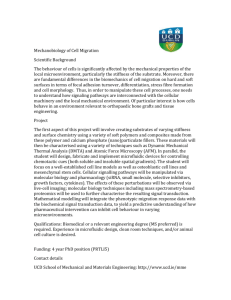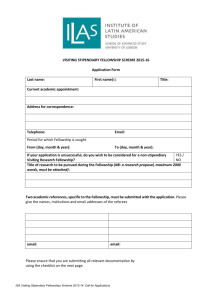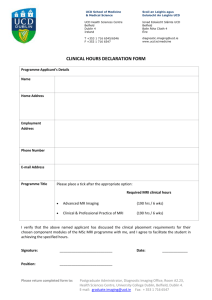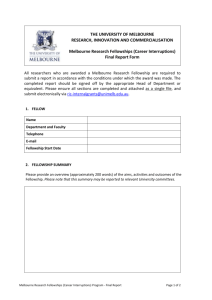CALL FOR UCD FELLOWSHIPS IN TEACHING & ACADEMIC
advertisement
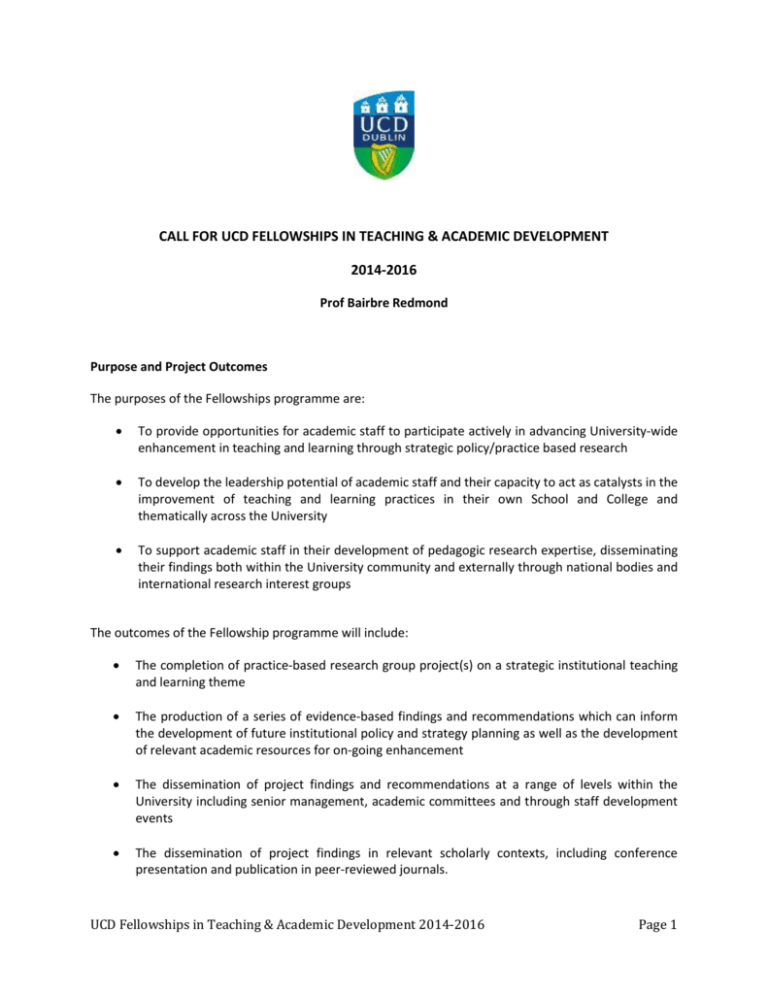
CALL FOR UCD FELLOWSHIPS IN TEACHING & ACADEMIC DEVELOPMENT 2014-2016 Prof Bairbre Redmond Purpose and Project Outcomes The purposes of the Fellowships programme are: To provide opportunities for academic staff to participate actively in advancing University-wide enhancement in teaching and learning through strategic policy/practice based research To develop the leadership potential of academic staff and their capacity to act as catalysts in the improvement of teaching and learning practices in their own School and College and thematically across the University To support academic staff in their development of pedagogic research expertise, disseminating their findings both within the University community and externally through national bodies and international research interest groups The outcomes of the Fellowship programme will include: The completion of practice-based research group project(s) on a strategic institutional teaching and learning theme The production of a series of evidence-based findings and recommendations which can inform the development of future institutional policy and strategy planning as well as the development of relevant academic resources for on-going enhancement The dissemination of project findings and recommendations at a range of levels within the University including senior management, academic committees and through staff development events The dissemination of project findings in relevant scholarly contexts, including conference presentation and publication in peer-reviewed journals. UCD Fellowships in Teaching & Academic Development 2014-2016 Page 1 1. Fellowship Theme 2014-16 Exploring and developing research-teaching linkages in the delivery of high quality student learning One of the original key objectives underpinning the establishment of the UCD Fellowships has been to address the complex interconnections between teaching and research. Locating and rewarding excellent and scholarly teachers within the research-intensive university is an essential but complex activity. Robertston and Bond (2001; 2005) advise acknowledging the variation and complexity between teaching and research and not to seek for unity but for dialogue that enables a productive co-existence of different ways of being. Key writers in the area have encouraged international debate about the quality of teaching within research-intensive universities. Hattie & Marsh’s (1996) significant meta-analysis saw teaching and research as separate activities but noted that the characteristics of creativity, commitment, investigation and critical analysis were common to both. The relationship between research and teaching can be interpreted in different ways. Research-led teaching primarily relates to the Humboldtian concept of giving students opportunities to ‘learn in a research mode’ (Elton 2005) either as part of active research groups or in classes designed to engender analytic approaches to knowledge acquisition. Researched teaching refers largely to the scholarship of teaching and learning where academics adopt a scholarly, evidence-based approach to their students’ learning and the impact of their own teaching on that learning (Boyer Commission 1998; Jenkins et al 2007; Healey et al 2009). Producing such evidence-based scholarship has been made easier by the growing capacity to harness institutional student academic data to decipher learning trends and patterns. Both approaches are seen to be relevant in creating what is often described as the teachingresearch nexus (Neuman 1996). In the Irish context the recent HEA Institutional Compact reiterates UCD’s position as a research intensive university committed to the two goals of high quality teaching and learning and internationally recognised research. The purpose of the Fellowship Theme (2014-16) will be to examine the question of research-teaching linkages in the context of a high quality student learning experience at UCD. This will be done with a view to developing a shared understanding of the linkages between research and teaching and identifying policies and practical ways to support academic staff integrate and embed these dual objectives in their academic practice. The types of areas that Fellows working in this theme will explore include: - How do UCD academics perceive the relationship between research and teaching? How is this reflected in their academic practice? What does UCD’s goal of research-led teaching mean from their perspective? - What examples of good practice in both research-led and researched teaching at UCD can be identified? What examples of effective research led learning for UCD undergraduates UCD Fellowships in Teaching & Academic Development 2014-2016 Page 2 - - can be identified? How has researched teaching improved educational standards and students learning in UCD? What development needs/requirements do academic staff have in relation to developing a researched approach to their teaching and/or implementing a research-led teaching approach to the curriculum? What development needs or opportunities do students require to become research-led learners and graduates with advanced research capabilities? 2. Selection and academic development of the Fellows 2014-16 Up to 6 Fellowships will be awarded, thereby allowing for the formation of two Fellowship research teams. This will provide critical mass and achievement of outcomes in an accelerated time period. Fellowship appointments shall be for a period of 20 months – commencing April 2014 – December 2015. Selection of Fellows will be by competition involving a Fellowship Selection Panel comprised of individuals with a range of expertise including: strategy, policy, pedagogy and prior Fellowship experience. A selection call against the nominated theme will be instituted and staff will be invited to submit applications online. Selection criteria will focus on evidence of: Pedagogic expertise and evidence of development of new approaches to teaching and learning; Track record of research publication and familiarity with a range of research methodologies. Evidence of academic leadership within own disciplinary area and into the University community or externally; Evidence of robust evaluation of own teaching and learning innovations, or appropriate pedagogic research; Academic and inter-personal attributes which will include: capacity for critical thinking; interest in engaging in a multi-disciplinary project; capacity for team-working; evidence of influencing skills and commitment to change and innovation. Academic development of Fellows will have three main components: All Fellows will participate in an Induction phase to include orientation to the Fellowship and to identify team roles, personal leadership strengths and potential projects; All Fellows will have access to a Critical Friend, who may have previously been a Fellow, throughout the Fellowship, this structure will be developed to ensure an appropriate skills/interests match between personnel; As part of the wider development of the Fellowship project, appointed Fellows will have opportunities to participate in expert fora/seminars with national and international academic colleagues UCD Fellowships in Teaching & Academic Development 2014-2016 Page 3 3. The management and operation of the programme; The project is sponsored by the Deputy Registrar Teaching & Learning, and managed by the Director of Academic Development (UCD, Teaching & Learning) who will support the Fellows on a regular basis, meeting at least bimonthly, to review progress against key project milestones. The project also has an external advisor, Professor Alan Davidson (The Robert Gordon University). Management of the project will follow closely from the purpose and outcomes defined above and key indicators of success will include: - Provision and dissemination of timely, relevant and practicable recommendations from the project (s) to relevant decision-making groups within the University; - Development of appropriate and relevant resources and contributions to academic staff development initiatives; - Participation in relevant scholarly fora including national and international networks (e.g. National Forum for the Enhancement of Teaching & Learning, Universitas21 and SRHE) - Publication of the project outcomes in relevant peer-reviewed journals - Production of a UCD Fellowship Report for internal and external dissemination. The start-up phase of the Fellowship project – April to July ‘14 – will be managed closely to ensure clarity in the definition of the project and intended outcomes. In this phase particular emphasis will be placed on ensuring the methodological robustness of the project, and close attention will be paid to identifying any development needs of the Fellows’ Groups. On completion of the project initiation phase, project proposals will be reviewed by the Fellowship Advisory Board which will: 1. confirm the feasibility of the project(s) or, 2. make recommendations for revision On-going management of the project will ensure that required resources and key milestones for successful completion are provided and monitored. 4. The governance and advisory inputs to the programme In addition to the external advisor to the Fellowships, it is proposed to establish a Fellowship Advisory Board which will serve to provide oversight and advice. It will draw on staff expertise as follows: - Deputy Registrar Previous Fellows (2) External Advisor Senior academics (3) UCD Fellowships in Teaching & Academic Development 2014-2016 Page 4 As noted above, the Board will have an important function in signing off the feasibility of the proposed Fellowship project(s) as well as receiving progress updates against project milestones. The Board will meet at least 3 times during the course of the Fellowship programme. Advisory inputs to the work of the Fellows will include: - Participation in Fellowship induction by experienced UCD Fellows; Research methods briefing by experienced UCD Fellow; Guidance on systematic literature review by experience DRHEA Fellow; Guidance on information sources: bibliographic; policy; international practice through UCD Teaching & Learning; Guidance on getting published and identifying appropriate dissemination opportunities through UCD Teaching & Learning. 5. Application Process Interested applicants should complete the online Fellowship application form which is accessible on the UCD Teaching & Learning website at (http://www.ucd.ie/teaching/academicdevelopment/fellowships/ ). Completed application forms supported by two completed Nomination letters, one of which should be supplied by the Head of School, can be submitted to fellowships@ucd.ie by Monday 7th April, 2014 @ 5.pm. For any further information, please contact elizabeth.noonan@ucd.ie . UCD Fellowships in Teaching & Academic Development 2014-2016 Page 5 5. Appendix 1 Project Schedule: January – mid February Week beginning 3rd March Monday 7th April Mid April End April April – July 2014 September 2014 –September 2015 October – December 2015 1. Definition and agreement of the Fellowship programme and Themes; 2. Development of promotional material and Fellowship paperwork Launch of Fellowship call with details of selection dates Fellowship closing date Fellowship selection Fellowship appointments Fellowship Induction phase begins: orientation, project scoping and planning, development support needs identified Execution of Project(s) phases Preparation for dissemination Project Budget: Group project budget €8000 Individual Bursary €5,000 Overall budget To include provisions for: Research assistance/ incoming expert visits/ electronic and printed resources/ outgoing study visits/ publication of findings / hardware or software necessary for execution of project To make provision for: Support for academic activities including grading, research analysis, and teaching to create time to participate in Fellowship. Individual development/project requirements including conference or other disciplinary network activities €38,000 References Boyer Commission on Educating Undergraduates in the Research University (1998) Reinventing Undergraduate Education: A Blueprint for America's Research Universities. New York: Stony Brook State University of New York. Elton, L. (2005) Scholarship and the Research and Teaching Nexus in R. Barnett (ed.) Reshaping the University: New Relationships between Research, Scholarship and Teaching. Open University Press, 108-118 Hattie, J. & Marsh, H.W. (1996) The Relationships Between Research and Teaching: A Meta-Analysis, Review of Educational Research 66 507-542 UCD Fellowships in Teaching & Academic Development 2014-2016 Page 6 Healey M and Jenkins A (2009) Developing undergraduate research and inquiry. York: HE Academy http://www.heacademy.ac.uk/assets/York/documents/resources/publications/DevelopingUndergra duate_Final.pdf (last accessed 26-02-14) Jenkins A, Healey M and Zetter R (2007) Linking Teaching and Research in Departments and Disciplines York: The Higher Education Academy http://www.heacademy.ac.uk/assets/documents/teachingandresearch/LinkingTeachingAndResearch _April07.pdf (last accessed 26-02-14) Neuman, R, (1996) Researching the Teaching-Research Nexus: A Critical Review Australian Journal of Education 40 (1) 5-18 Robertson, J. & Bond, C. (2001) Experiences of the relation between teaching and research: what do academics value? Higher Education Research and Development, 20(1), pp.5-19. Robertson, J. & Bond, C. (2005) The research/teaching relation: A view from the ‘edge’, Higher Education, 50(3), pp.509-535. UCD Fellowships in Teaching & Academic Development 2014-2016 Page 7


